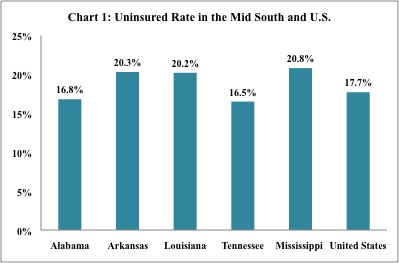Building Toward Economic Mobility in Mississippi: Health Care
August 20th, 2012
Health insurance not only ensures access to medical treatment when needed, it also ensures financial security. The uninsured are less likely to seek preventative care and are more likely to be hospitalized. Likewise, uninsured families are more likely to be burdened by medical bills, which may lead to medical debt. Unfortunately, low-income working families face the greatest risk of being uninsured and are oftentimes one medical emergency or illness away from financial instability.
Mississippi has the eighth highest uninsured rate among the 50 states and the District of Columbia. According to the 2012 Assets and Opportunity Scorecard, which assesses America’s financial security, approximately 18 percent of all Americans under the age of 65 do not have health insurance, while 21 percent of Mississippians under the age of 65 do not have health insurance (see Chart 1). Additionally, 32 percent of Mississippians are asset poor, meaning that they do not have available financial resources, like money in a bank or assets in a home or car, to weather an emergency such as a medical emergency.
The Affordable Care Act (ACA) and Medicaid expansion will expand health care coverage to nearly all low-income working families.
This will significantly lessen the financial strain of health care costs typically accrued from a medical emergency or chronic illness. Health care coverage also encourages low-income working families to pursue preventative care and treatment, minimizing the effect a medical condition would otherwise have on a person’s ability to earn an income. Without the ACA and Medicaid expansion, health care costs may otherwise require low-income working families to exhaust their financial reserves and, consequently, reduce their opportunity to build assets for future investments.
Source: CFED, Assets and Opportunity Scorecard, 2012.






